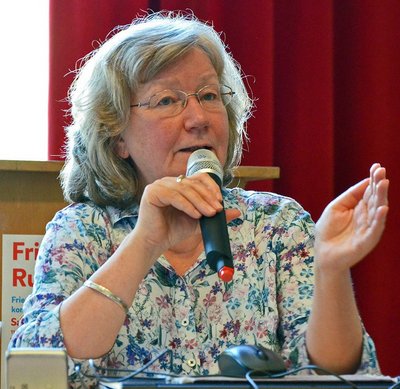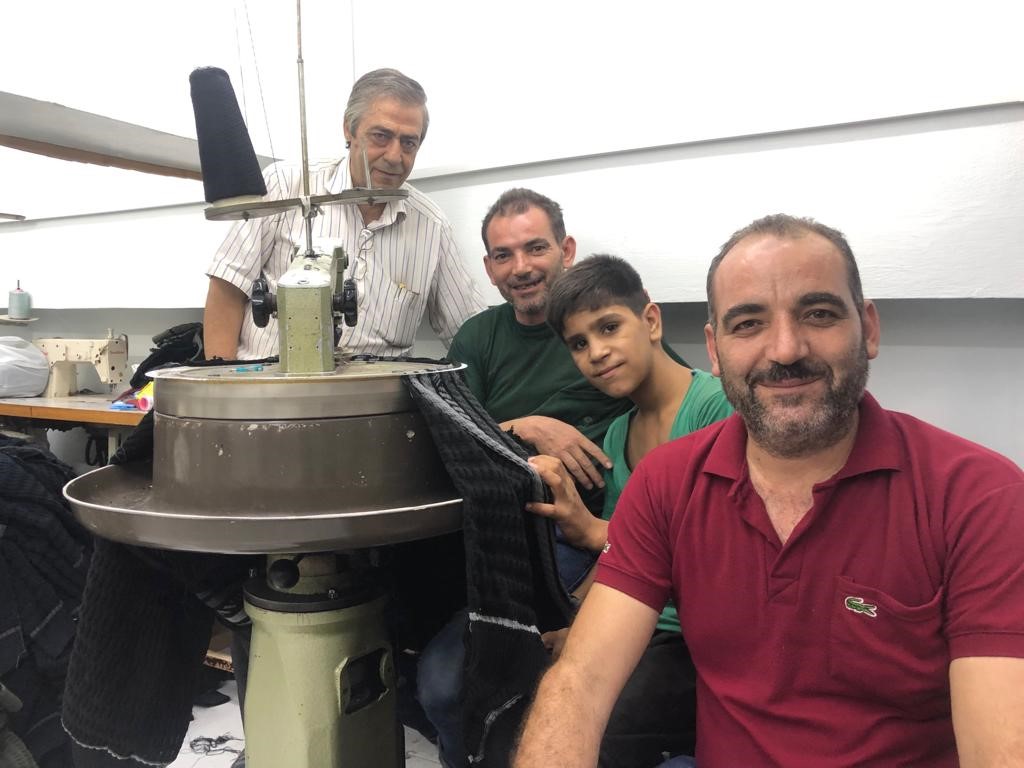Syria: Ten years of war
by Karin Leukefeld, Bonn and Damascus

(Picture T. Gräser)
In March 2011 an uprising started in Syria with protests in several cities escalating violently in the same month. In vain, the opposition within Syria called for dialogue with the government rather than taking up arms. In July 2011, 150 Syrian members of the opposition met in Damascus putting forward three demands to the government: no armed forces in residential areas, release of prisoners, and dialogue. At the same time, the “Free Syrian Army” was founded in Turkey and went to war in Syria, having been armed from abroad.
The events and the war that followed were fueled by “social media” from the Syrian opposition abroad, Al Jazeera and Al-Arabiya channels, while major Western agencies and media houses were spreading the news around the world. The media were followed by anti-government militants, then international troops moved in. Russia and Iran supported the Syrian government. Turkey and the US-led international anti-IS alliance supported the government opponents, arming and training them.
Ten years later, the war-torn country is once again in the spotlight. Politicians parade themselves with international and private aid organisations, talking about the suffering of the people, the need to help and urging donations. The Syrian opposition, mostly living abroad, keeps pointing the finger at the government in Damascus and is supported by Western countries in return.
Political approaches to a solution and offers for dialogue are stagnating. Parts of northern Syria are still occupied by Turkey and troops of the US-led “anti-IS alliance”. Local government opponents – jihadists in the northwest and Kurds in the northeast – are establishing new political and economic structures with foreign aid and money. Syria is denied access to its national resources of oil, gas, wheat, cotton and water.
About 6.5 million people have left Syria. Most of them have been living as refugees in camps in neighboring countries for years. Around one million people, including large parts of the technical and medical educational elite, were able to reach Europe, especially Germany. Those who are still living in their homeland or in refugee camps in neighboring countries are reminded daily of what they have lost.
Aid organisations: politically helpless …
Peter Maurer, president of the International Committee of the Red Cross (ICRC), referred to the difficult humanitarian situation in Syria exacerbated by a severe economic crisis and, furthermore, the Corona pandemic further isolating the country. Civilians, he said, are paying the price of a lack of political breakthrough. “We need a political solution to end the conflict,” Maurer said prior to his planned visit to Syria. “The people of Syria cannot afford to endure another year like this, let alone another ten”.
Under the heading “10 years of war in Syria”, the government-affiliated German Welthungerhilfe (German aid for world hunger), founded in December 1962 by then President Heinrich Lübke, published a video clip on the situation of children: “A whole generation grows up in ruins,” is the title of the slow-motion footage on the organisation’s website. Not to be overlooked, the button “Your donation counts” reminding the public: 43 euros for a hygiene package, 100 euros provide 1000 people with daily bread, 200 euros help to run a “protective space” for 500 women and children.
… politically instrumentalised
A Welthungerhilfe staff member recently visited a refugee camp in Azaz and reported on it in numerous media. Azaz is a Syrian town located north of Aleppo, about 10 km from the Syrian-Turkish border. Azaz is controlled by Turkey and by combat units of the former “Free Syrian Army”, now calling itself the “National Syrian Army”. Native inhabitants of the village told the author (in Aleppo in January 2020) that family members stayed in Azaz to preserve their houses and fields. They were forced to sell their products in the markets in Turkey and not in Aleppo, as they had used to do.
Azaz is considered the base of the self-proclaimed Syrian Government in Exile, which is also supported by Germany, and German Welthungerhilfe cooperates there with IHSAN Relief & Development, among others. The organisation, which is close to the Syrian opposition, considers itself a “service organisation” for externally financed aid and development and, according to its own information, it is active in areas in the northwest of Syria and in Deraa, areas that are controlled by armed government opponents.
The Syria coordinator of Welthungerhilfe referred to the Fifth EU Pledging Conference “Supporting the Future of Syria and the Region” at the end of March to raise money to keep funding the work of aid organisations in and around Syria in order to improve the situation for the population. Furthermore, it is important that cross-border humanitarian aid to Syria be continued and, if possible, expanded. The UN Security Council is to decide on this in June.
Effects of the sanctions are not an issue
Syria rejects this and wants to distribute all aid within Syria to all regions. The country is also demanding support or at least an end to the obstructions in the process of reconstruction. But the EU and the USA reject this because they would lose influence in Syria. The business with the help pushes necessary long-term political solutions into the background. The effects of the unilateral EU and US sanctions against Syria are not an issue, although UN officials repeatedly denounce the devastating consequences.
For thousands of staff of national and international aid organisations in and around war-torn Syria, it is important that their projects are funded and their salaries too. Many seem to have forgotten that the goal of their work is not to provide makeshift care for people in unbearable shelters, but to return these people to their homes. Humanitarian aid can only be temporary, explained the staff member of a large UN organisation, who did not want to be named. In conversation with the author in Damascus (September 2020), she said that the goal must be for people to find work, housing, health care, school and education, security and happiness again in their homeland. No one wants or should be dependent on aid packages and live in tents for the rest of his life.
No policy of détente in Syria
While the economic situation in Syria continued to deteriorate in 2020, the EU again extended its unilateral economic sanctions against the country and signalled absolutely no willingness to talk. Not with Russia or Iran, even less with Syria. Only two months after the death of Foreign Minister Walid Mouallem in November 2020, his successor, Foreign Minister Feisal Mekdad, was added to the EU sanctions list. The EU sanctions list against Syria comprises 289 persons and 70 companies and organisations. Détente looks different.
The USA, in alliance with the Kurdish-dominated self-government in the north-east of the country, is not only securing the plundering of Syria’s oil, wheat, cotton and water resources, Washington extended the threat of sanctions with the “Caesar Act” far beyond Syria to all those who do business with Syria as a state, company or individual. Not affected are states which, like Germany, finance so-called “stabilisation projects” in the Turkish-controlled areas around Azaz or in Idlib, or which, like Japan, recently transferred millions of US dollars to an opposition fund “for stabilisation” in north-eastern Syria.
Cold War and geostrategic interests
With the expansion of illegal military bases on Syrian territory, Washington is signalling that it has no intention of leaving Syria and the region soon. This was underlined recently by the airstrikes by US fighter jets on Iraqi security forces on the Syrian side of the Al Bukamal border crossing, which connects Syria and Iraq. This is the only border crossing through which Syrian traders can currently transport their goods to Iraq and from there on to the Gulf states: Textiles from Aleppo, citrus fruits from the coastal region or vegetables from Deraa. The more direct border crossing between Syria and Iraq, Al Tanf/Al Walid, is blocked by an illegal US military base.
The USA and the EU with their allies are building a front against Iran. Nato defence ministers decided at the end of February to increase the Nato mission in Iraq almost tenfold from 500 to 4,000 soldiers. Massive armament of the Arab Gulf states, of Jordan and Israel speaks its own language. After ten years of war in Syria, the geopolitical goals are clear. The decision, still made under the Trump administration, to include Israel in the US Central Command area is an accolade for Israel. For a long time, there had been thoughts of building a new Nato with the Arab Gulf monarchies under Israeli leadership.
EU marks the region as a sphere of interest
The EU and Germany make no secret of their geostrategic claim in the “southern neighbourhood”, and so political and financial resources are not put into debt relief and strengthening the badly battered economies in Iraq, Syria, Lebanon and Jordan, but into the military expansion of their own and allied forces in the region. For the population, what remains at best are (aid) projects of civil-military cooperation – a tent, a hygiene package – to secure the geostrategic goals.
A concept for dialogue and reconciliation, as attempted since 2017 by the Astana Initiative of Russia, Iran and Turkey, exists neither in the EU nor in the USA. With the Astana Initiative two of the opposing sides in Syria – the Syrian government and an alliance of Islamic government opponents – are in talk and are supported by the UN Special Envoy for Syria Geir O. Pedersen and the International Committee of the Red Cross. The USA and the EU are boycotting the Astana process because they have other plans for the region. The people who live there are not being asked. •
(Translation Current Concerns)

(Picture Karin Leukefeld)